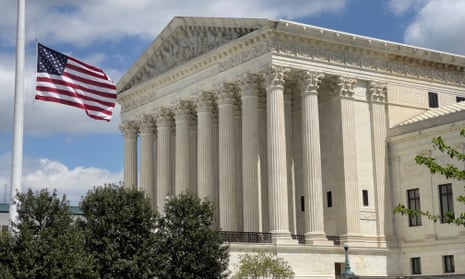The newly conservative-leaning US supreme court has declined to place new limits on sentencing juveniles to life in prison with no chance of parole, marking a break with the court’s previous rulings which had been gradually moving towards more leniency for minors over the past two decades.
In a ruling that illustrated the the impact of the appointments of three justices by former president Donald Trump, the high court ruled to reject arguments by Brett Jones of Mississippi, who was convicted of killing his grandfather at age 15 and is serving a sentence of life without parole. The court’s six conservatives were in the majority, with the three liberal members dissenting.
The justices rejected arguments by Jones, that his sentence violated the constitution’s eighth amendment ban on cruel and unusual punishment because the judge in his trial had not made the finding that he was “permanently incorrigible”.
The “argument that the sentencer must make a finding of permanent incorrigibility is inconsistent with the court’s precedents”, Justice Brett Kavanaugh, who was controversially appointed to the bench in 2018 under the Trump administration, wrote for the majority.
In a scathing dissent, the liberal Justice Sonia Sotomayor wrote that the high court’s decision “guts” precedents that had strictly limited juvenile life sentences without possibility of parole. She added that the ruling was attempting to “circumvent” legal precedent and was “fooling no one”.
Beginning in 2005, the supreme court had concluded in a series of cases that minors should be treated differently from adults, in part because of minors’ lack of maturity. That year, the court eliminated the death penalty for juveniles. Five years later, it barred life-without-parole sentences for juveniles except in cases of murder. In 2012 and 2016 the court again sided with minors. The court said life-without-parole sentences should be reserved “for all but the rarest of juvenile offenders, those whose crimes reflect permanent incorrigibility”.
Today's decision is a huge blow against the movement to end juvenile life without parole. As Sotomayor correctly notes in her dissent, the court "guts" precedents that had strictly limit JLWOP. This is a major defeat for JLWOP reform. https://t.co/XS5CPsa2In pic.twitter.com/fTczLRlYqN
— Mark Joseph Stern (@mjs_DC) April 22, 2021
Since that time, Justice Ruth Bader Ginsburg and Justice Anthony Kennedy, whose votes were key to those decisions, have been replaced by more conservative justices.
The current case asked the justices whether a minor has to be found to be “permanently incorrigible”, or totally incapable of being rehabilitated, before being sentenced to life without parole.
The specific case before the justices involved Jones, who is now 31, and was convicted of fatally stabbing his grandfather in 2004 in a dispute involving the boy’s girlfriend.
Jones was 15 and living with his grandparents when he fatally stabbed his grandfather. The two had a fight in the kitchen after Bertis Jones found his grandson’s girlfriend in his grandson’s bedroom. Brett Jones, who was using a knife to make a sandwich before the fight, stabbed his grandfather first with that knife and then, when it broke, with a different knife. He was convicted and sentenced to life in prison without the possibility of parole.
In the case – Jones v Mississippi, 18-1259 – Jones had argued he is not “permanently incorrigible” and should therefore be eligible for parole. Mississippi says the eighth amendment does not require that Jones be found to be permanently incorrigible to receive a life-without-parole sentence, just that Jones’s status as a minor when he committed his crime be considered.
